Sufiya Ahmed & Hazem Asif
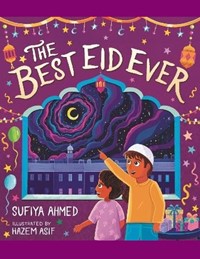
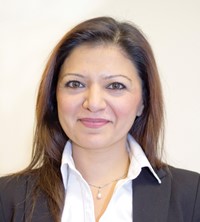
About Author
Sufiya Ahmed and illustrator Hazem Asif introduce their new picture book, The Best Eid Ever.
Sufiya Ahmed has worked in advertising and in the House of Commons. Now a fulltime author, she has written several books including Ruby Ali's Mission Break-Up, Rosie Raja: Churchill's Spy and Under the Great Plum Tree. Follow Sufiya on Twitter @sufiyaahmed.
Hazem Asif is a graphic designer and illustrator from Lahore, Pakistan, who has illustrated books including Nura and the Immortal Palace. Hazem's work has been displayed in exhibitions and publications around the world. Find him on Instagram @worldofhazem.
Interview
The Best Eid Ever (Bloomsbury Education)
February 2024
Sufiya Ahmed and illustrator Hazem Asif introduce their new picture book, The Best Eid Ever. The story follows a family through a day of Eid celebrations, reflecting for Muslim children everywhere the excitement of the day, and giving children who aren't familiar with Eid a glimpse into traditional Eid celebrations.
Review: I shared this book with 6-7 year olds who all celebrate Eid and it was wonderful seeing their smiling faces reading a book about their faith and celebrations.
Q&A with Sufiya Ahmed and Hazem Asif
"My story is for all children to enjoy. It is a mirror for some children in that they can relate to what is in the story
because they experience the same things, and a window for others."
1. Can you tell us a little about yourself and the kinds of books you write and illustrate?
Sufiya: I write books from Young Adult, Middle Grade, Early Chapter books to Picture Books. Whatever story is buzzing around in my head finds itself on paper and I am very fortunate to have many of them published. In my books, the main characters are British Asians, sometimes Muslim but not always.
Hazem: I am an illustrator and graphic designer from Lahore, Pakistan and I graduated from the Virginia Commonwealth University School of the Arts campus in Doha, Qatar.
I have been a passionate reader since childhood, and I grew up reading books like Harry Potter and authors including Enid Blyton, Roald Dahl, C.S. Lewis, and R.L. Stine. Lately, I have enjoyed books by Hannah Gold, Lesley Pass and Phil Earle.
As an illustrator, I have worked across publishing, editorial, film, sciences, and academia. I have illustrated books such as Nura and the Immortal Palace by Maeeda Khan (WalkerBooks) and the Rosie Raja series by Sufiya Ahmed (Bloomsbury). I enjoy exploring themes that are socially conscious and reflective of the society and the world we are living in. Most of my works have been inspired by our rich culture, the multi-layered life in Pakistan.
2. Why did you want to write a story for young children about Eid, The Best Eid Ever? Is it aimed at both those who do and who do not celebrate Eid?
Sufiya: There are nearly two billion Muslims in the world and the majority celebrate Eid. Christians have Christmas, Hindus have Diwali, and Muslims have Eid.
My story is for all children to enjoy. It is a mirror for some children in that they can relate to what is in the story because they experience the same things, and a window for others. In that sense it's for children who celebrate Eid as well as those who know nothing about it.
3. Why did you base the story around a full day of Eid?
Sufiya: Eid day is packed with mosque prayers, family meet-ups, sharing food with neighbours and presents. A Muslim child wakes up with great excitement on Eid morning. It's exactly the same as children who wake up excited about Christmas, which is mainly all about the presents.
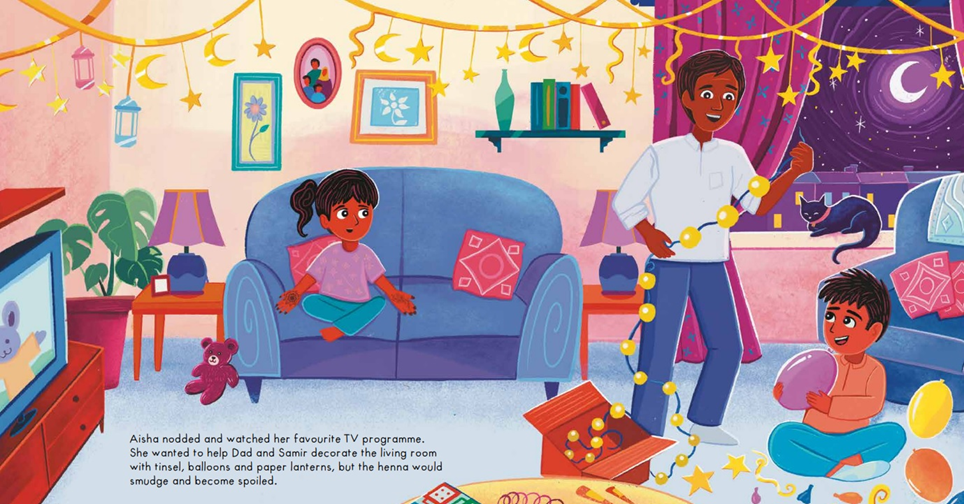
4. And what attracted you to illustrating this story, Hazem?
Hazem: In my childhood, I remember reading a lot of Urdu-inspired picture books on Eid and other festivals. I was always mesmerized by their lovely watercolour illustrations. When the opportunity to illustrate a book on Eid arose, I jumped at it. It felt like a complete cycle for me. With this Eid picture book, I wanted to create something that was nostalgic of my childhood but slightly more modern through my own illustrative style.
5. What challenges were there in illustrating the story? And what did you enjoy most about the project?
Hazem: One of the challenges of illustrating was the setting of the narrative. The story takes place in the UK, so it was a fun time studying and researching British-style homes, interiors, and streets.
6. What will children find out about Eid in The Best Eid Ever, and why did you decide to include the additional notes about Eid and the glossary at the end?
Sufiya: I think readers will understand the community spirit of Eid. Also that it marks the end of the month of fasting, Ramadan, which is a very spiritual time for Muslims. The moon sighting is a tradition which everyone takes seriously. Eid can only be celebrated once the moon is spotted, as Muslims follow the lunar calendar.
I added the notes to give a background to Eid. It is a time of giving charity which is a pillar of Islam. This means that it is a requirement of the religion to give a portion of their wealth to the poor every year.
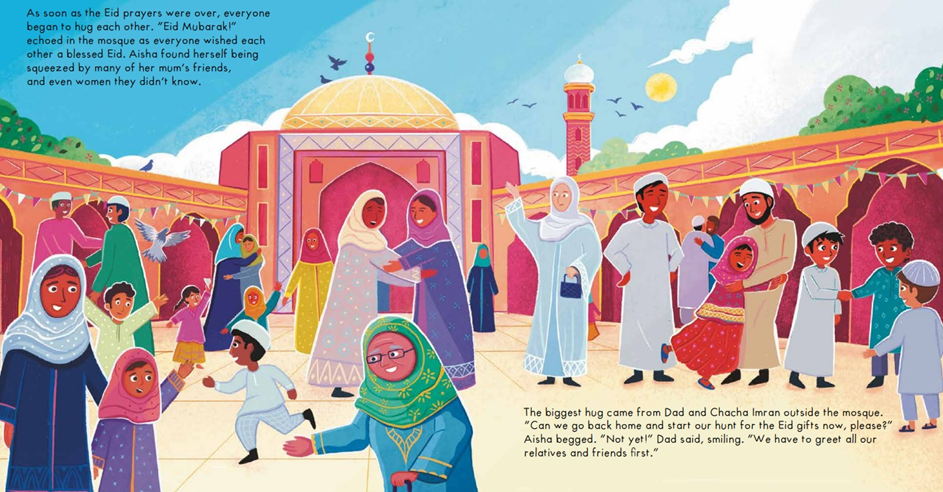
7. How would you like adults to share this with children, and perhaps to take it further with them? Where can children go to find out more?
Sufiya: This story can be used at storytime in school, or read at home bedtime with children. There are riddles to be solved to find the Eid presents. The story is a mirror and window and I hope the classrooms that pride themselves on being inclusive will display copies for the children.
8. Food and presents are a big part of the story - but what are your own memories of Eid celebrations as a child? And what do you enjoy the most about celebrating Eid now?
Sufiya: Eid is really special for children, and I have lovely memories of it as a child. I could hardly sleep the night before because of the excitement. I always had new clothes and shoes to wear and lots of gifts to look forward to. We would get together with cousins and family friends and eat and play board games.
Eid is for children to enjoy the most and it gives me pleasure now to organise the day so my own nephew has a brilliant time that he will cherish.
Hazem: I have wonderful childhood memories of Eid. My Eid were always filled with lovely family gatherings, reunions with distant aunts and cousins, dinners and most importantly, money, or as we call it in Pakistan, 'Eidi', that every child would receive from the elders. My brothers and I would always challenge ourselves in collecting the most Eidi and at the end of the festival, we would spend it on buying video games, toys, or books.
Eid has changed a lot since I grew up. When I was a child, Eid revolved around collecting the most Eidi, but now, the dynamics have shifted. It's more about giving Eidi to the next generation of kids - a sort of 'Karma strikes back' scenario. However, I still savor the delicious cuisines, cherish family gatherings, and take pleasure in wearing the latest Eid clothes.
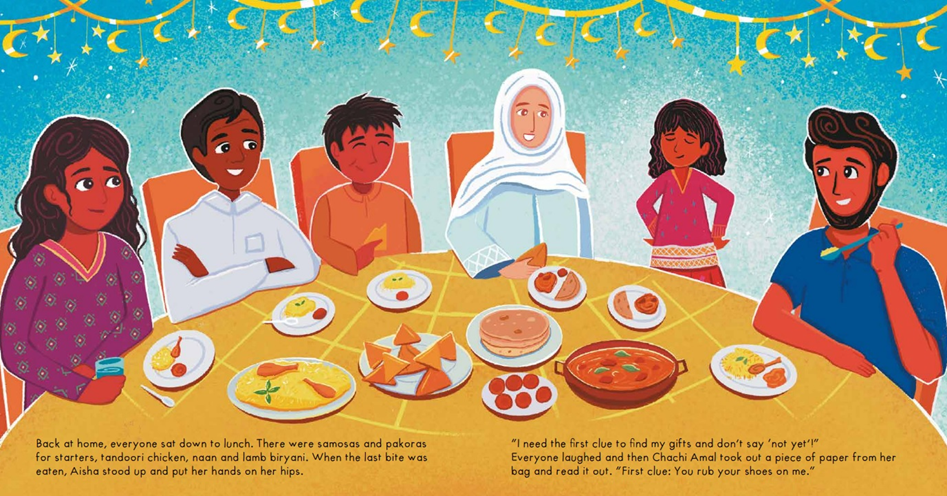
9. Are you planning to create more picture books? What are you writing / illustrating currently?
Sufiya: I'm always planning new books. I'm currently working on a new middle grade book which is the third in the Rosie Raja series. It's about a young 12-year-old girl who becomes one of Winston Churchill's spies. It's called Rosie Raja: Undercover Codebreaker and is full of secrets and spies. It is a lot of fun to write, and the series is especially popular with boys.
Hazem: I absolutely adore illustrating for children and would love to create more picture books. I recently wrapped up another picture book and am currently illustrating cover art for a number of new books.
10. What other kinds of things do you enjoy celebrating during the year?
Sufiya: We have two Eids to celebrate in a single year. The second one, Eid-ul-Adha, is celebrated after the Haj pilgrimage which Muslims must perform once in their lifetime (if they can afford the travel to Mecca in Saudi Arabia). That Eid is about community connections and giving to the poor, too.
Christmas is another festival where we get together as family. Its much easier to do as it's a national holiday. We exchange chocolate boxes with our neighbours.
My best friend is Sikh so I grew up being included in Diwali celebrations at her house. I've always seen my dad exchange presents and food with his Hindu friends who also celebrate Diwali. They do the same with him on Eid. I think respecting and marking the faith festivals of our friends and neighbours brings us closer together, and more accepting of each other.
 The Best Eid Ever
The Best Eid Ever
